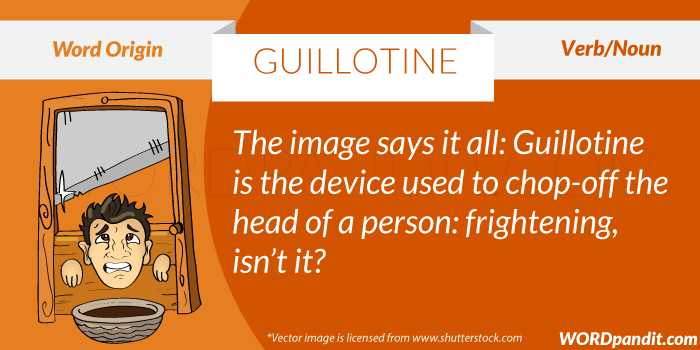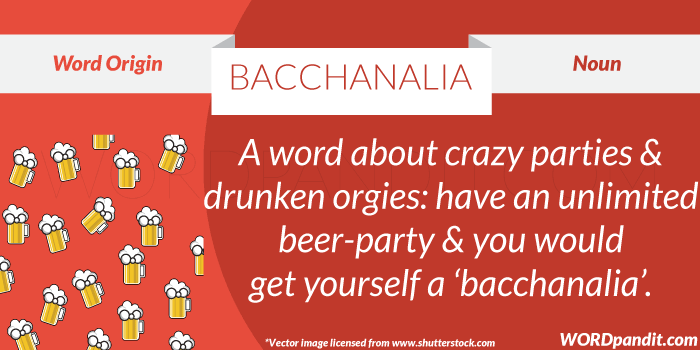In the last article, we learned how to learn words through roots. In this post today, we extend the same discussion forward and see how word origin stories can help in learning words. There are times when names of individuals lend themselves to words, then there are times when interesting word combinations are used to coin words.
Let us have a look at few of these combinations:
1. Badger
Badger has a really interesting word origin story. But before we get to the story, let us have a look at “badger-the animal”. This is what it looks like:

How did this animal name come to be used as a verb?
N the late 18th century, there was the common sport of badger-baiting in play. In this sport, dogs would be set upon badgers in an attempt to draw them from their burrows. The dogs would fight with them and eventually kill it. This “harassment” of innocent animals lent us the word “badger”. Thus, when a lawyer badgers a witness, he would force him or her into the corner till the time they agree to his version of events.
Read full post here: Badger
2. Guillotine

The GUILLOTINE is something that was invented to replace older and harsher methods of execution but it became a terror in itself. It was in fact the device of execution during the French revolution.
When the French revolution took place and the National assembly came into power, it ordered the setting up of a committee that would come up with a better method of execution and wished to replace decapitation with a sword or axe. The committee formed included Dr. Antoine Louis and Dr. Joespeh-Ignace Guillotin as members of the committee. It is the latter’s name that the device guillotine borrows. The device chosen by the committee borrowed the traditional Italian and Scottish designs and added a very sharp and heavy blade to it. This blade, placed at a height, would decapitate instantly and with complete certainty.
Read full post here: Guillotine
3. Bacchanalia

This is word of divine origin, with it being based on the name of the Roman God Bacchus. Bacchus is the Roman variant of the Greed god Dionysus. Dionysus, in Greek mythology, was the god of the winemaking and wine, and through the route of intoxication lead to ecstasy and liberation. And Bacchus takes over a similar role in Roman mythology.
The term Bacchanalia is derived from the initiatory rites that were dedicated to Bacchus. In these ceremonies, there was an incorporation of carnality, sexually licentious behaviour, induced obviously through excessive drinking. Gradually, the cult of Bacchus drew the ire of the Roman authorities and more and more restrictions were placed on it.
Read full post here: Bacchanalia
4. Euthanasia
 Euthanasia basically means an easy way of dying. This is at times a need of people who are suffering from extreme disease and have no chance of recovery. As a method to escape the suffering, they wish to be killed. In simple terms, this is known as Mercy Killing (to kill someone out of mercy for his condition).
Euthanasia basically means an easy way of dying. This is at times a need of people who are suffering from extreme disease and have no chance of recovery. As a method to escape the suffering, they wish to be killed. In simple terms, this is known as Mercy Killing (to kill someone out of mercy for his condition).
The word Euthanasia has Greek origins. It comes from the Greek prefix eu, well or easily, and thanatos, death. This translates to the modern day meaning of putting hopeless invalid to death painlessly. Thanatos, in Greek mythology, was the personification of death. Thanatos was twin brother of sleep and the son of the night. We can actually see the mythical overlay in these relationships, with death being an extension of sleep and night.
Read full post here: Euthanasia
Each of the above offers a method to learn in fact: You know the story, you know the word. Use this method to explore a few words, and in case you come across some interesting information, do tell us.










Great work guys….this is helping me a lot for my cat preparation….ur ways and techniques are outstanding
you r doing a gr8 help in our studies.
Firstly,I would like to thank you for providing us this stuff by innovative techniques and IT services. I am a big fan of your site and work.
For vocabulary,I think,following structure similar to NL(word power made easy) book would be very useful. You are providing many services but all those seems to be loosely connected in terms of final effect which is to fix a new word permanently in memory.
The main reason why it would be more helpful is:when it provides the origin of one word,it gives the list of words derived from that origin. Obviously,this would enhance the learning speed.
The secondary reason: for making a word permanent in one’s memory,when one reads a new word,she needs to use it in different scenarios. Considering your loosely connected implementation structures of word introduction and practice of words(test),It can’t help us to make a word permanent in our memory. Embedding what NL has applies in his book-introduce a word,make user use it in different scenarios, make user practice until it gets fixed in memory-into your system would be drastically helpful to the users. So Developing a platform where you first introduce a word and subsequently make user to use those word across different scenarios and then make them practice(connecting this chain of three element is very important according to me for fixing a word permanently into one’s memory)would be very helpful to us.
Finally,We would like to keep track of our history:what words we have learned,what word tests i have given etc. So providing a individual account would be great.
I would conclude by saying that employing psychological method of learning by IT services is a big initiative and we expect this from you. I am no expert on word learning practices. So please ignore my opinions if you find it illogical.
Hi bhagukrishna
great inputs and would like to inform you that we are working on all of the above
we have our technical limitations as of now, but we are improving with time, and you would soon see a lot of upgrades…we are building a new portal Testpandit (www.testpandit.com) which has a lot of features that you are talking about
keep in touch with us, and you would see a lot of changes.
regards
Wordpandit
Hi, i found your site really very lucrative for the students preparing for CAT and related B School entrance examination. The material provided by you are very helpful and supportive.